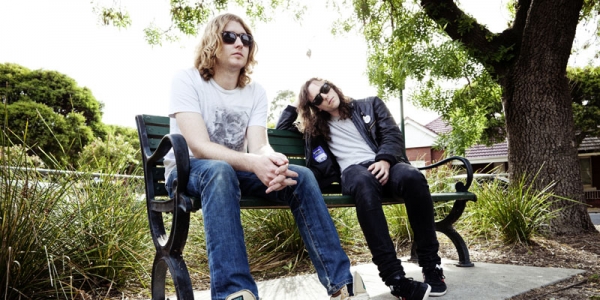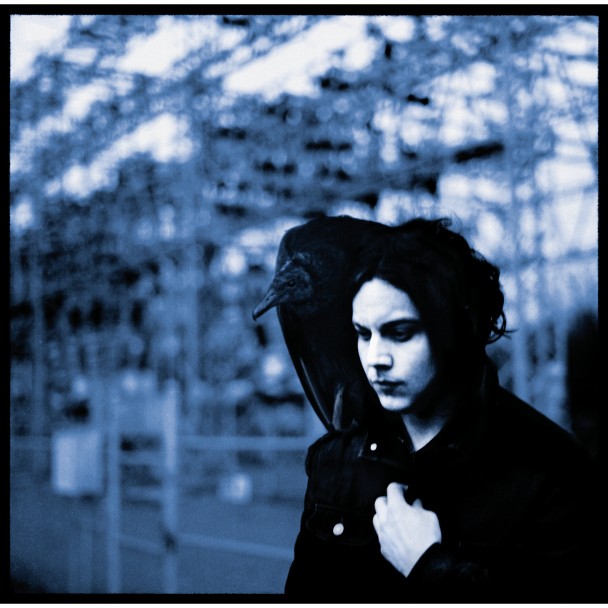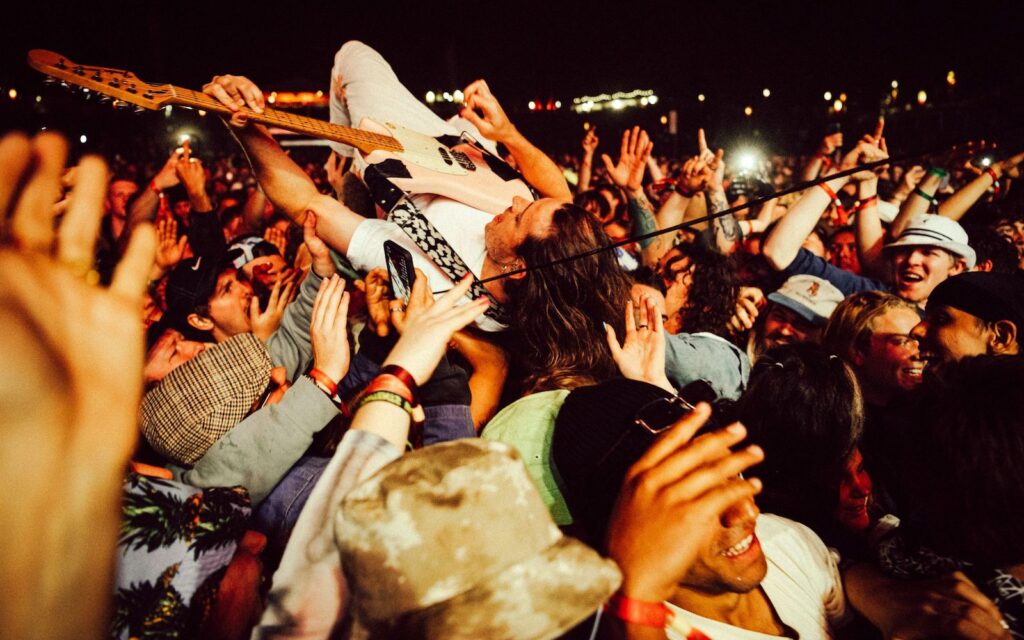“It’s been a long day of interviews,” shrugs Ridley, passing me their exhausting schedule for the day. We talk briefly of doing the interview in a bar, which perks their interest, if only slightly. It’s only when we begin to share our experiences at festivals such as CMW and SXSW that the band truly becomes at ease. Soon, sheer excitement takes over. It’s evident through the giddy smiles the band adopts; DZ Deathrays is a band that long to be onstage.
Asked to look back on the immense 2011 they had, the bombastic punk duo confess that amidst a great year, opening for Foo Fighters and Fucked Up at the 45,000 seat AAMI Park stands out.
“There were quite a lot of highlights,” says Parsons. “Foo Fighters, that was pretty insane.”
“We loved all the guys on that lineup. There was no rock’n’roll ego going around,” notes Ridley.
“Usually you do tours with other bands, and the crews kind of look down on you. But this crew went out of their way to make us feel at home,” says Parsons.
There’s an air of youngish enthusiasm in DZ Deathrays, evidenced in the appreciation they show towards those who’ve leant a hand along the road. No trace of vanity can be found in listening to the guitarist/singer and drummer, as they quickly follow-up on each other’s answers.
“When we opened for Foo Fighters in the Gold Coast, we were just in amazement of how many people there were,” says Parsons. “When we finished, I literally had to take my guitar to the car, drive to the airport and we made our flight with just minutes to spare. We flew back to Melbourne and did a show at Northcote Social Club. It was just such a heavy feeling, walking offstage after playing to thousands of people and then sitting on a Tiger flight to play to an entirely different group of people. Everything was so rushed and last minute.”
With the release of Bloodstreams, their debut full-length, feeling rushed is something Ridley and Parsons may have to get used to. Still, they’ve managed to avoid tiring from the road for now. When asked if they’ve felt overwhelmed by their sudden fame, they pause, hum and look at each other before Ridley speaks up.
“If anything, we’ve been very surprised at the amount of UK press that we’ve been getting. Only because we went there once and we already started getting heat,” says Ridley. “I went back to work after that tour and I was sitting at my desk and I read the article NME wrote on us. I just sat back, and thought ‘Holy shit,’” he says with a dropped jaw and widened eyes. “I wish I was back in England playing shows.”
“Goddamn it,” says Parsons, quickly afterwards. “We should be back there. We’ve just got to keep that up though, and keep going back as much as possible.”
Though Parsons was referencing the UK, he could have been speaking about any touring stop outside of Australia. In anticipation of the release of Bloodstreams, DZ Deathrays traveled back to the UK and also made stops in Canada the USA, including a now mythologised gig at SXSW, where the band’s set was abruptly cut short because of noise violations.
The day after our conversation, the band played an early day timeslot at Laneway Festival. Larger than expected crowds joined the band, and the duo responded with a concise but still hell-raising set. Regardless of timeslot or festival, DZ Deathrays is committed to playing every stage they can, in the hopes of making waves in a country that has not responded the way others have.
“So many great bands in Australia get trapped,” says Parsons. “We didn’t want that to happen to us, so as soon as we could, we worked towards getting our money together and getting out as much as possible.”
“The more you do play outside of your home country, the more your home country takes notice of you,” offers Ridley. “Our shows at Laneway meant a lot of people were checking us out for the first time, even though we’ve been down to Melbourne 45 or 50 times in the last three years.”
And the frequency with which DZ Deathrays tour is only the beginning: these two are no flash in the pan duo. Their thrash pop sound, cultivated through a string of singles and an EP is remarkably mature one. Sure, they’re a party band at heart, evidenced in the fallout from their often chaotic live shows. When the band is locked into a song onstage however, the intense amount of gigging they do shows up in spades.
“We really like dance music as well, believe it or not,” says Ridley a good 30 minutes into the interview. As they discuss their craft, their shift in the office-room atmosphere is palpable. “But everything about dance music is really locked in, the way it goes from point to point. When we demo’d the record, we were all over the place. When it finally came time to record with [producer Richard Pike of PVT], we made an effort to always lock it in. He’s very aware of groove. He was pushing us to keep things tight. People like something that gets them moving a bit, and we’re aware of that.”
It’s a notion that DZ Deathrays have long been aware of. On their recent EP No Sleep, the band showed signs of their ability to craft precise thrash pop. It’s the hope of both Ridley and Parsons that with the jump to the full-length Bloodstreams, their vision will become realised and they’ll finally begin to garner the same amount of attention in their native Australia which they do abroad.
“Over the years we’ve been trying to figure out what we want to do,” says Ridley. “Instead of trying to incorporate a little bit of everything, we set out to make a solid punk record with attitude, but that’s fun as well.”
“You see bands that’ve got three laptops set up and you can’t hear what sound is coming from where,” continues Parsons, showing an attitude that contains a healthy amount of punk ethos. “I just couldn’t even imagine setting up laptops or that kind of shit.”
“When we play we use a laptop for our lighting. It kills me that people might think we’re using the laptop for our show,” says Ridley, looking defeated.
With band chemistry and the drive to gig clearly not an issue for the band, Ridley’s comments were worth questioning. After receiving high praise from major media outlets, DZ Deathrays now find themselves in a favourable position that could soon turn detrimental. They’ve garnered enough hype, but with Bloodstreams, it’s high time for the boys to deliver. What many would perceive as a challenge, DZ Deathrays find an opportunity to do what they do best: take to the stage.
“We always wanted to be known as a live band. We just needed the record as an excuse to tour and bring people to the shows,” says Parsons with a sense of affirmation. “On record, we try to capture that energy and translate it into the studio as best as we could. And you know, maybe it’ll be the only one we ever do. But at least then we can look back on it and feel proud that we went into it with the same enthusiasm that we put into our live show.”
Parsons continues, echoing the general bewilderment and ultimate acceptance of the band’s fate.
“We haven’t anticipated anything to the extent that has happened.”
Though the band seem intent on purveying a carefree approach, as our hour-long conversation winds down, the subject of their reception in Australia cannot be avoided.
“We’re a love and hate band anyways,” says Ridley. “There’s a lot of people that’ve written us off very easily anyway, because they think ‘Oh, they’re just a two-piece band that scream and shout.’ It might not be for everyone, but you also get some people that are into it. Maybe that was the thing about the UK: people just seemed to get it right away. There’s a very solid rock’n’roll scene in the UK that might’ve existed ten years ago in Australia.”
As Ridley continues, both members take on a serious tone, dissecting some of the issues they have with the industry.
“But now there’s a borderline hardcore sound which is really in favour now. In Australia, things are dictated by the radio.”
DZ Deathrays has made a name for themselves as a band that lives to be onstage. Though the mood in the room ultimately turned light once again, if the band do get serious and accept their fate, they won’t remain unknown in Australia much longer.
“It’s too folky sometimes too,” says Parsons.
“Yea,” agrees Ridley, as both of them break out into laughter. “Folk and dubstep.”
“We’ve been saying we should just start a folkstep band and take it to the next level and then hopefully we’ll get some serious press. Then maybe we’ll be the ones to kill it off and we can go back to doing what we want to do.”
BY JOSHUA KLOKE







